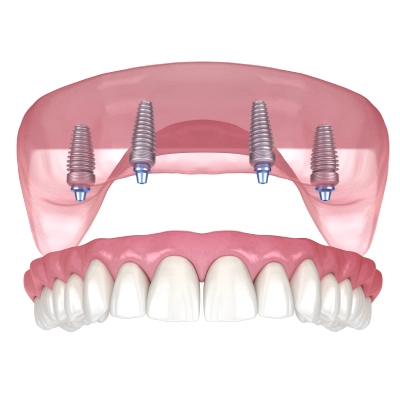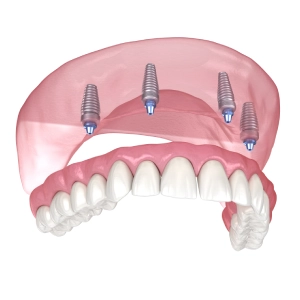What is Denture Stabilization?
Denture stabilization offers an appealing solution for millions of Americans missing most of their teeth. While single implants provide the gold standard in tooth replacement, the cost can skyrocket when replacing numerous teeth.
Dentures offer an affordable alternative, allowing patients to replace all missing teeth at a fraction of the cost of implants. However, traditional dentures have drawbacks like difficulty eating and constant movement in the mouth.
Many denture wearers dislike the taste and inconvenience of adhesives. Denture stabilization bridges the gap, offering a superior option to traditional dentures at a more accessible price than full implant coverage.
Understanding Denture Stabilization
Denture stabilization involves the placement of implants within the mouth to hold dentures in position securely. While single-tooth implants are commonly used, dentures become a practical solution when a person requires replacement for many teeth.
However, traditional dentures often present discomfort or excessive movement, which can be inconvenient and even embarrassing—nobody wants to experience dentures slipping while biting into a sandwich! Moreover, the unpleasant taste of many denture adhesives can linger in the mouth throughout the day, detracting from the enjoyment of eating and drinking.
Do I Need Denture Stabilization?
The most effective approach to determining your suitability for denture stabilization is discussing the procedure with your dentist. To be eligible for the procedure, your jawbone must have the capacity to support the metal post; otherwise, proper fusion may not occur.
Nonetheless, dentists can make minor adjustments to accommodate individuals with deteriorating jawbones. This may involve opting for a different type of implant instead of a metal post. For instance, a dentist might choose to utilize a clip that attaches securely over the gum line. The dentist might opt for a bone graft to reinforce the weakened area in severe deterioration.
What are the Various Types of Stabilized Dentures?
There are two primary types of denture stabilization: ball-retained and bar-retained dentures.
Ball-Retained Dentures
Ball-retained dentures, also referred to as stud-attachment dentures, involve implants in the jawbone fitted with metal attachments. These attachments on the implants connect with corresponding attachments on the dentures.
Typically, the implant attachments resemble balls, while the denture attachments resemble sockets, facilitating a snug fit where the ball inserts into the socket. While variations exist, the fundamental concept remains consistent: a ball-and-socket mechanism.
Bar-Retained Dentures
In contrast, bar-retained dentures necessitate a minimum of two to five implants in the jawbone. These implants are linked by a metal bar that curves along the jawbone. The denture is then placed over this bar, and attachments on either the implants, dentures, or both aid in securely fastening them together.
What are the Benefits of Denture Stabilization?
When you get denture stabilization from Smoke Rise Dental, there are several benefits that you’ll get:
Enhanced Comfort
Traditional dentures often shift uncomfortably on the gums, leading to irritation and soreness. Denture stabilization eliminates this discomfort by securing the dentures, ensuring a snug and comfortable fit throughout the day.
Boosted Confidence
Denture wearers may experience self-consciousness due to the fear of dentures slipping or falling out during social interactions. Denture stabilization restores confidence by firmly anchoring the dentures, alleviating worries of embarrassment, and allowing individuals to engage in social activities without hesitation.
Improved Oral Health
Conventional dentures can cause gum irritation and sores, potentially leading to infections and oral health issues. Additionally, the lack of stimulation to the jawbone may result in deterioration and an increased risk of gum disease. Denture stabilization addresses these concerns by integrating dental implants, which stimulate the jawbone and prevent denture movement, promoting better oral health and reducing the risk of associated complications.
Enhanced Bite Force
Stabilized dentures offer a stronger bite force than traditional dentures, enabling individuals to enjoy a wider variety of foods. This improvement in bite force supports better nutrition and overall health by facilitating the consumption of healthy foods that may be challenging to chew with conventional dentures.
Increased Durability
Denture stabilization significantly enhances the durability of dentures by increasing their resistance to breakage. With a reinforced ability to withstand biting forces, stabilized dentures are less prone to damage, resulting in a longer lifespan and reduced need for frequent repairs or replacements. Additionally, the permanence of stabilized dentures eliminates the nightly removal for cleaning, simplifying maintenance, and extending their longevity comparable to natural teeth care.
Never Ignore Missing Teeth
Schedule your appointment with us today! Reach out to Smoke Rise Dental in Stone Mountain, Georgia, directly at (678) 730-4991. You can book an appointment with our skilled doctors, Dr. Hassan Moeti and Dr. Jessica C. Davis.
FAQs
Do I need denture stabilization?
Stabilized dentures may be suitable if you lack all your upper or lower teeth and possess sufficient jawbone for implant support. If your bone structure requires reinforcement, Drs. Lewis and David Morrison can discuss a bone grafting procedure. To determine your candidacy for stabilized dentures, please consult with Morrison Dental Care.
Is denture stabilization the same as implants?
In some cases, our dentists can use dental implants to improve the fit and function of your existing dentures. This process, called denture stabilization, involves placing implants and modifying your dentures to snap onto them securely.
What is a stabilization in dentistry?
Do you find your dentures uncomfortable or insecure? They might slip or slide while you eat, making it difficult to enjoy your meals. If this sounds familiar, then Denture Stabilization could be a solution for you. This innovative process utilizes dental implants to anchor your dentures securely, eliminating the worry of them shifting in your mouth.










